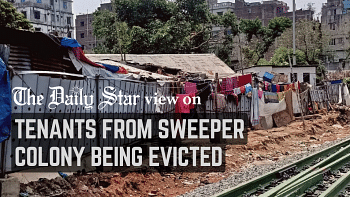Eviction of marginalised communities: Exploited by all

Do the city authorities ever ask themselves what happens to evicted slum dwellers and marginalised communities – including the Telugu, Harijan, and cleaner communities – living in various colonies once they are driven from their homes? The authorities have, over the years, failed to ensure the dignified rehabilitation of the victims in the aftermath of evictions. At times, authorities have acted irresponsibly and belligerently – in the face of concerns expressed by the National Human Rights Commission and various human rights groups – in accelerating these drives. On many occasions, even the High Court has had to intervene and give verdicts staying evictions.
But why such apathy for slum dwellers or hawkers or waste workers, who are living in designated colonies? Do slum or colony residents enjoy living in dilapidated, sub-human conditions? Do hawkers like sitting on the footpaths day-in and day-out, their skin burning under the scorching sun or being drenched by downpours, only to earn a meagre sum selling trinkets? Certainly not. But they endure these conditions because authorities have failed to provide them with dignified working and living conditions.
And when these eviction drives are conducted, without the rehabilitation or resettlement of affected individuals and families, it results in the double failure of the state in providing for the marginalised communities or even ensuring their basic human rights.
The problem is aggravated if the eviction victims belong to the "untouchable" communities – Harijans, Telugu, among others – as they are stigmatised and shunned away by society as well, essentially rendering them homeless after evictions.
This happened in the case of the TT Para Sweeper Colony families, who had been evicted earlier from their homes without notice or rehabilitation. This community used to work under the railway authorities and live in the area adjacent to Phulbaria's old railway station, and moved to TT Para Sweeper Colony in Kamalapur 42 years ago, when they were resettled from their previous home, to make space to construct Nagar Bhaban.
While unpalatable, the fact remains that it is the marginalised who fall the first victims of exploitation and discrimination, be it by criminals or the authorities. It is always them – lacking access to a dignified life, education opportunities, decent work, healthcare, adequate legal support, civic facilities, financial tools, exposure in the media – whose human rights are trampled upon by all.
Now, in the face of authorities' expedited drive to construct a rail line connecting Kamalapur to Jashore, this community is once again facing the risk of being uprooted – without any concrete or visible plans for their dignified resettlement.
Although authorities are saying that they will construct a building for this community in Shahjahanpur Railway Colony, accommodating so many families in one building – 112 families were evicted in 2019, another 27 families in December last year, and around 40 more families are at risk of being evicted any day now – will provide a major logistical challenge for authorities.
Project director for the Padma Bridge Rail Link, Md Afzal Hossain, had a somewhat puerile response for a reporter of this daily: "Most people are living here illegally. Many of them are retired from the railway service, many of them work for the city corporation and most of them work in private companies. I ensured that those who are living legally in the colony will be rehabilitated. A building is being prepared for them in Shahjahanpur Railway Colony. We will shift them there as soon as possible."
His myopic reply raises many questions. Isn't the state responsible for retired railway workers? Did eviction authorities coordinate with the city corporation for the resettlement of those working for them? How many of the residents actually work for "private companies"? What will happen to those who live in the colony "illegally"? And what is the quantification of "as soon as possible"?
The grim fate of the Telugu community, who were recently evicted by the DSCC from a Telugu slum in Jatrabari's Dhalpur area, perhaps gives us an idea of how the TT Para Sweeper Colony inhabitants may fare post their eviction.
In the name of rehabilitation, the Telugu families were given land next to the slum to build housing for themselves, but without any money or other means to do so. How did the DSCC think the poor families would arrange money or find logistics to build themselves a shelter? With very meagre salaries and very little access to finance through formal channels, some resorted to loan sharks to borrow money at exorbitant and unreasonable interest rates. Even then, there was only 150 square feet for each family. Those who could not afford to go to loan sharks have been rendered homeless and are now living in dire conditions – with the luckier among them sharing the homes of their friends and families.
Those who have managed to build tin sheds on the land provided by the DSCC have no access to drinkable water, gas, or electricity. And only 20 basic latrines are available for their use, the conditions of which are so deplorable that they cannot be considered hygienic sanitation facilities. The DSCC mayor has cited the tender process as a cause for delay in addressing the problems facing the Telugu community. Those involved with the eviction and tender process could perhaps be invited to spend a night in the Telugu community's "residences" to experience firsthand their misery, if only for the process to be expedited.
While unpalatable, the fact remains that it is the marginalised who fall the first victims of exploitation and discrimination, be it by criminals or the authorities. It is always them – lacking access to a dignified life, education opportunities, decent work, healthcare, adequate legal support, civic facilities, financial tools, exposure in the media – whose human rights are trampled upon by all.
It is high time the authorities revisited their approach towards eviction, prioritising dignified rehabilitation and resettlement of the victims and ensuring their basic human rights, before eviction drives are conducted.
Tasneem Tayeb is a columnist for The Daily Star. Her Twitter handle is @tasneem_tayeb


 For all latest news, follow The Daily Star's Google News channel.
For all latest news, follow The Daily Star's Google News channel. 






Comments